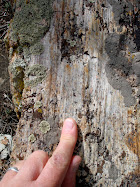Everything I'm doing on my first day of my intro class was inspired by the blogosphere.
There was a great post by Andy Revkin of the NY Times a few weeks ago, talking about disaster memory in elephants and humans. In a drought, old elephant matriarchs lead their groups to far-away water holes that don't dry up. Revkin makes the connection to human memories of disaster: are memories of what to do in a tsunami, or a drought, or a hurricane remembered? He comments that:
As I’ve said here before, it now seems in some ways that scientists are like society’s elders, with awareness of past disasters absorbed from years of studying mega-droughts recorded in tree rings, or coastal destruction etched in layers of sediment, or great earthquakes recorded in displaced stream beds.He says "scientists." I say "geoscientists," because every one of these examples is the sort of thing that we study. And in a world in which geology is often left behind by adults, limited to memorizing rock types in grade school, those of us who teach general education science courses may have the last chance to give people access to the wealth of knowledge that geoscientists have accumulated.
So that will be the theme of my course introduction: how humans deal with a planet that, though perfect for life, can also be deadly.
I'm going to show these images:

Hurricane Gustav late on Sunday, from NOAA. New Orleans has been evacuated. Buses carried away those who didn't have cars of their own. The Superdome and the Convention Center are thankfully empty. Even if the city floods again (which I hope it will not), hopefully New Orleans has averted a repeat of the horrifying tragedy of all those people, trapped in their homes with water up to their roofs, or stuck in the Superdome with no way to leave the city. Three years is manageable on a human time scale. The wounds have not yet healed. People remember.
But what about disasters that happen less frequently?

The town of Chaiten, Chile, buried in mud by volcanic mudflows after the eruption of Chaiten volcano. Thanks to The Volcanism Blog for this picture.
Chaiten volcano was a caldera, a great circular hole left by an ancient eruption. It had been 9000 years since it erupted last, but in May, when it came to life, the warning signs were clear. The town of Chaiten was evacuated. And 4000 people are still alive who might not otherwise have been. Perhaps Chaiten was close enough to the volcano that the people would have left. But other towns (such as Armero, Columbia in 1985) have been destroyed by similar processes. When disasters happen 9000 years apart, it is unlikely that human memory (even if cultural traditions have been passed on) will be sufficient to tell people what to do. But geologists can be like elephants. We can remember.
And sometimes memory of the past isn't a sufficient guide for the future.

Extent of Arctic sea ice on August 30, from the National Snow and Ice Data Center.
Sometimes physical models provide guides when there is no obvious analogy in the past. The Arctic sea ice is melting. What does that mean, other than drowning polar bears, opportunities for new oil drilling, and arguments over who owns the floor of the Arctic Ocean? I don't have clear answers, but understanding the basics of climate science and oceanography can help make sense of what scenarios are more likely than others.
And then we come home to Durango.

I'm going to make them sketch and think about this picture while I find out who's in the class, and where they're from. I probably won't ask what kinds of stories their families tell, though I'm curious whether the Navajo students, in particular, understand some of their stories as warnings. (I have to show them how to use course management software and stuff as well. And remind them to buy the book.)
I stole the idea from Andy Revkin, and the examples from a recent post by Callan Bentley and older posts by The Volcanism Blog. Thanks, everyone, for good ideas. :)






